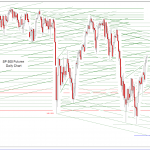The thing about politics is nobody knows anything. We learned that in November 2016.
There’s a particularly high degree of “know-nothingness” in Washington these days. That creates a lot of uncertainty.
Markets are reacting to it… and that’s really good news for us, actually, because it makes our work that much easier.
I don’t much care either way for “MAGA,” walls, coal, or even tariffs, for that matter.
I do concern myself with how those things might impact markets – the U.S. Treasury market, in particular.
Usually, we focus on stuff like the upcoming reports on the housing market. We’ve seen signs of weakness in June and July, so August will provide an important set of data.
But, still, markets are moving more than ever to political winds.
We saw that on Monday, as stocks opened lower on worries of an escalating trade war with China.
And, yet, this morning the S&P 500 Index gapped up to a new intraday all-time high.
Volatility: It’s our friend.
Of course, it’s not so much the S&P 500 we’re concerned with. It’s yields on U.S. government debt we follow.
They move, too, sometimes a lot…
But volatility in the Treasury market is our friend – and it can be your best friend…
I’d love to show you how. In fact, I’m hosting a presentation on September 25 where I’ll explain the simple and easy system behind a “two-hour work year”…
Data Dumps
Our attention now is on that housing data.
It’s not likely to have much impact on the September 25-26 meeting of the Federal Open Market Committee. The Fed is pretty much locked in for another quarter-point rate hike next week.
But inflation pressures did abate last month.
Both the headline and the “core” Consumer Price Index (CPI) readings came in below consensus forecasts. Headline and “core” producer prices were also short of estimates.









Leave A Comment